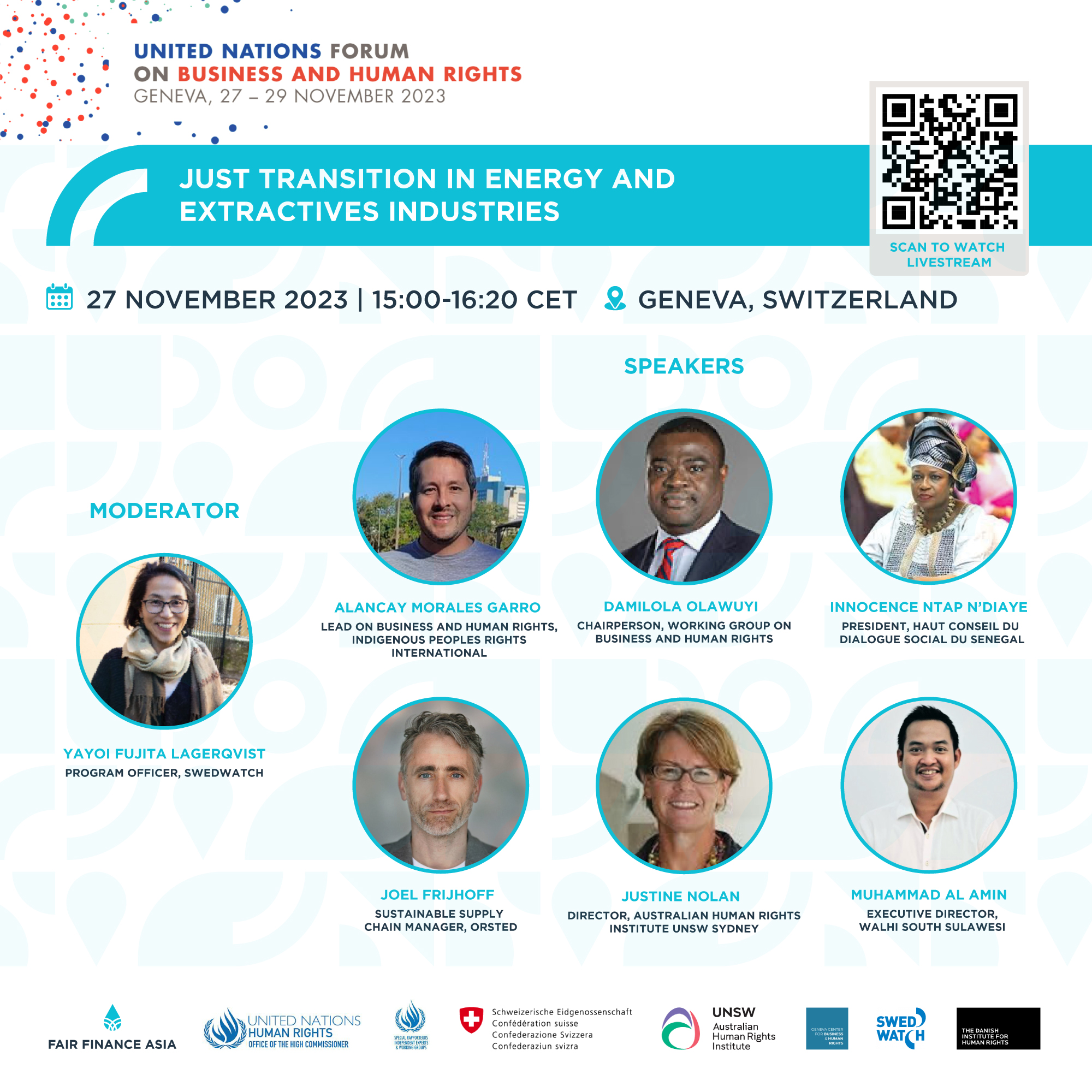
TO WATCH THE LIVESTREAM, CLICK HERE.
Background
On November 27, 2023, Fair Finance Asia (FFA) together with the Australian Human Rights Institute UNSW Sydney, Business and Human Rights Centre University of Geneva, Permanent Mission of Switzerland, Swedwatch, and the UN Working Group on Business & Human Rights, with support of the Danish Institute of Human Rights and the Office for the UN High Commissioner for Human Rights will conduct a session, “Just Transition in Energy and Extractives Industries,” at the 12th UN Forum on Business and Human Rights in Geneva, Switzerland.
Session Background
As the global impacts of climate change intensify, there is a growing sense of urgency among States and business enterprises to take actions to mitigate human-caused climate change. The urgent calls to accelerate actions include fast-tracking the energy transition and shifting away from intensive production and use of fossil fuel energy towards the efficient production and use of renewable energy. Various States and business enterprises have announced their commitments to reduce greenhouse gas emissions in alignment with the Paris Agreement to achieve net zero emissions by 2050. However, to achieve a resilient future for people and the planet, the energy transition must be not only environmentally sustainable, but also inclusive and just. A rights-based transition that is grounded on principles of global environmental justice, gender equality and human rights is particularly important, considering the legacies of extractive industries and large infrastructure development projects.
Objectives
- Provide critical human rights and environmental risks faced by rights holders in the context of transitioning towards renewable energy.
- Draw on initiatives led by States and business enterprises to prevent and mitigate environmental and human rights risks linked to the energy transition. In particular, the panel discussion will illustrate what measures are undertaken by States and enterprises to prevent and mitigate environmental and human rights risks, learning from the legacies of extractives and large-scale infrastructure projects.
- Shed light on potential strategies, and pathways towards inclusive and just energy transition with heightened responsibility for human rights due diligence among States and business enterprises.
- Emphasize the importance of upholding the right to participation and information and fostering international cooperation to ensure a just transition.
- Discuss strategies for ensuring job opportunities, capacity-building and skill development, guaranteeing access to comprehensive social security and safeguarding human rights defenders.
Speakers
The session will be moderated by Yayoi Fujita Lagerqvist, Program Officer, Swedwatch. Speakers will include Alancay Morales Garro, Lead on Business and Human Rights, Indigenous Peoples Rights International; Damilola Olawuyi, Chairperson, Working Group on Business and Human Rights; Innocence Ntap N’diaye, President, Haut Conseil du Dialogue Social du Senegal. Joel Frijhoff, Sustainable Supply Chain Manager, Orsted; Justine Nolan, Director, Australian Human Rights Institute UNSW Sydney; and Muhammad Al Amin, Executive Director, WALHI South Sulawesi and member of ResponsiBank Indonesia.
More information
For more information on the session modality and access to relevant background documents, click here.